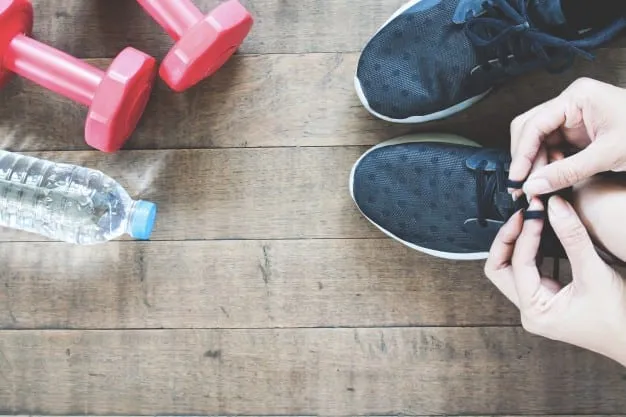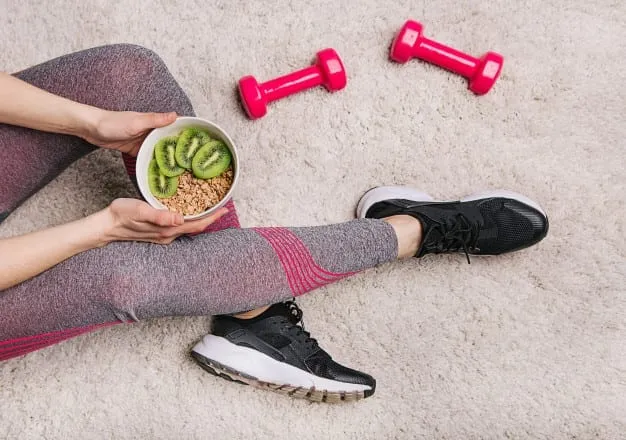In addition to being very important for improving your performance, eating the right foods after hitting the gym improves post workout recovery and helps the body to refuel.
List of Essential Diet Friendly Food, Must Have in Fridge [India]
Why Is Post-Workout Nutrition Important?
The intake of suitable nutrients after working out is crucial for maximizing the results of the training session.
During training, muscles use glycogen as fuel. In addition, protein in the muscles gets broken down. This means that after the session is over, the body struggles to restore glycogen supplies and rebuild protein in the muscles. Optimal nutrition after exercising helps the body achieve this faster.
By consuming a balanced diet, you help the body to:
- Rebuild glycogen reserves
- Reduce protein breakdown in the muscles
- Boost muscle growth
- Speed up recovery
What Are the Best Post-Workout Nutrients?
Although there’s plenty of contradicting information on pre and post-workout nutrition, fitness experts generally agree that your diet should be a balance of all nutrients: proteins, carbs, and fats. The foods you’ll be consuming after the workout should be easy to digest in order to be absorbed by the body quickly and efficiently.
Recommended Post
Restore and Build Muscles with Protein
Eating protein-rich foods after a training session provides amino acids which are necessary to restore the broken down protein in the muscles. In addition, consuming proteins enhances the growth of new tissues in the muscles.
The recommended amount of protein largely depends on the individual body weight, but generally, it’s 0.70 – 1.40 oz. (from 20g to 40g), or from 0.14g to 0.23g of protein per pound body weight.
The most protein-enriched foods to eat after working out include:
- meat (oily fish like salmon or tuna, as well as chicken and turkey, are the best options)
- plant-based and animal-based protein powder
- eggs
- dairy (especially Greek yogurt and cottage cheese),
- protein bars
Speed Up Muscle Recovery with Carbs
Carbohydrates help rebuild the depleted muscle glycogen. Carbs are especially important for professional athletes and people who train regularly. They are also essential for people who practice high-endurance sports such as swimming, skiing, and cycling, i.e. sports that result in higher glycogen expenditure than bodybuilding (weight training).
It’s worth mentioning that there are different types of carbs. Simple carbs are bad carbs which the body breaks up quickly in order to be used as energy. They’re usually present in refined and processed sugars like table sugar, candies, soft drinks, and syrups.
Your diet should consist of complex carbohydrates which are found in the following foods:
- potatoes
- rice
- vegetables like dark leafy greens
- fruits (especially bananas, berries, and pineapples)
- rice cakes
- quinoa
- oatmeal
- unsweetened chocolate milk
- whole wheat pasta
When combined with proteins, carbohydrates boost insulin production. Insulin is responsible for the regulation of the metabolism but it also facilitates the glucose absorption from the blood and converts it into glycogen.
The carbohydrate-protein ratio should be 3:1. The amount of carbs after a training session is 0.5g –0.7g per a pound of body weight.
Fat is Good
Although fats can slow down nutrient absorption in the body, they also have some positive effects when taken after a training session. Good fats boost muscle growth without affecting the synthesis of glycogen in the muscles. Still, it’s worth noting that fats are less important than carbohydrates and proteins and should be taken in limited amounts.
How Hrithik Roshan Came Out from Belly Fat and Made Six Packs?
Your diet should consist of natural fats found in the following foods:
- Nuts
- Avocado
- Nut butter
- Dried fruits
What is the Best Timing for a Post-Workout Meal?
The ability of the body to restore glycogen and protein increases after exercising, so it’s best to consume food soon after the training session, preferably within a 45-minute time frame. Afterward, the results decrease by almost 50%.
However, if you can’t eat right after the workout, at least try to consume something before the training session. Namely, the pre-workout meal has extended effects to after the training is finished.
Examples of Post-Workout Meals
Here are some simple food combos to help you create meals filled with the nutrients mentioned above.
Meat and fish meals
- Grilled chicken and roasted veggies
- Whole wheat wrap with turkey
- Whole grain bread sandwich with tuna
- Crackers and tuna
- Salmon with brown rice or sweet potatoes
Fruit meals
- Poached eggs and avocado toast
- Protein powder, oatmeal, almonds, and banana
- Fruits with cottage cheese
- Low-fat milk with cereal
- Greek yogurt, granola, and berries
- Banana and protein shake
- Quinoa with walnuts and berries
- Banana and peanut butter smoothie
- Orange slices and almonds
List of Essential Diet Friendly Food, Must Have in Fridge [India]
Veggie Meals
- Hummus and pita bread
- Black beans, brown rice, and vegetables
- Rice crackers with natural peanut butter

Consuming large amounts of water pre, during, and post workout is very important. When you’re working out, the body loses lots of electrolytes and water through the sweat. They must be restored in order to improve both performance and recovery. If possible, fluid balance should be restored within twelve hours after the working out session.
The intake of a balanced diet comprised of protein and carbs after a workout is very important.
It stimulates protein synthesis in the muscles, facilitates recovery, and prepares your body for the next training session.
You should eat your post-workout meal within 45 minutes to two hours after the training session.
Finally, don’t forget to drink a lot of water in order to maximize the benefits of the workout.
https://findhealthtips.com/aamir-khan-inspired-me-for-six-pack-abs/

